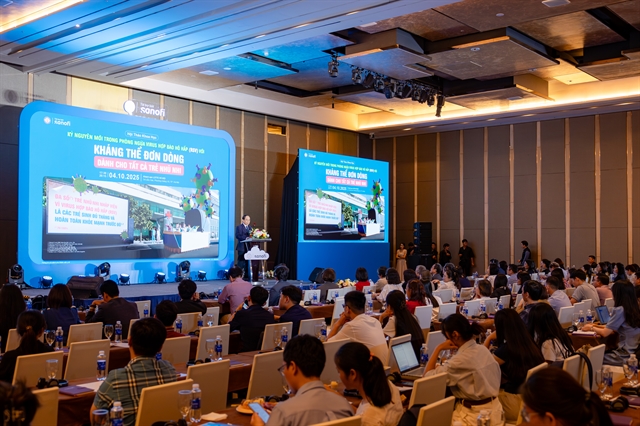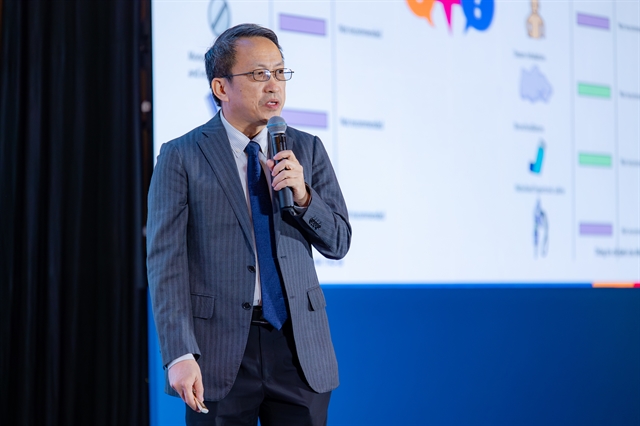 Society
Society


|
| The seminar series on RSV prevention with long-acting monoclonal antibodies for all infants attracted a wide array of medical experts. |
HÀ NỘI — A scientific seminar titled “A New Era in Respiratory Syncytial Virus (RSV) Prevention with Monoclonal Antibodies for All Infants” brought together leading Vietnamese and international experts to discuss the transformative potential of monoclonal antibodies in preventing RSV infections among infants.
Hosted by the Việt Nam Paediatric Association and sponsored by Sanofi Aventis Việt Nam Co., Ltd., a subsidiary of the French pharmaceutical company Sanofi, the event focused on advancing RSV prevention through immunisation strategies that are both innovative and inclusive.
RSV: A silent but serious threat
Speaking at the event, Dr Lê Kiến Ngãi, PhD, MD, Head of the Preventive Medicine and Infection Control Department at Việt Nam National Children’s Hospital, highlighted alarming statistics from the World Health Organisation (WHO) which indicated RSV is responsible for over 80 per cent of lower respiratory tract infections, such as pneumonia and bronchiolitis, in infants under 12 months during peak season worldwide.
“Nearly 70 per cent of infants contract RSV in their first year, and almost all children are infected by the age of two,” Dr Ngãi noted. “Early infection is linked to a higher risk of long-term health issues including wheezing, otitis media, asthma, and increased healthcare use in later years.”
Dr Ngãi stressed that while premature infants or those with chronic conditions are more vulnerable, full-term, healthy newborns are also at risk of hospitalisation and severe complications. “One of the biggest challenges in RSV management is the inability to predict which infant will develop severe symptoms,” he added.
A new hope: Long-acting monoclonal antibodies
Assoc. Prof. Dr Bùi Bỉnh Bảo Sơn, Vice President of the Việt Nam Respiratory Society and the Việt Nam Paediatric Respiratory Society, explained that RSV circulates throughout the year in Việt Nam, with regional variations in peak periods. With no specific antiviral treatment available, clinical care remains largely supportive.

|
| Dr. Bùi Bỉnh Bảo Sơn shared his insights during the seminar. |
“The introduction of long-acting monoclonal antibodies such as nirsevimab marks a major breakthrough,” Dr Sơn said. “Nirsevimab provides immediate, targeted protection with extended duration. It can be administered shortly after birth, offering effective early prevention against RSV.”
Dr Trương Hữu Khanh, Vice President of the HCM City Infectious Diseases Association, shared that nirsevimab has already been rolled out in several countries with promising real-world results.
“Clinical studies and field data show that nirsevimab significantly reduces RSV-related lower respiratory tract infections that require either hospitalisation or outpatient treatment,” he stated. “It is indicated for all infants, whether full-term, preterm, or with underlying health conditions, providing comprehensive protection during the most vulnerable months of life.”
Broader impact on public health
Assoc. Prof. Dr Nguyễn Thanh Hùng, Vice President of the Việt Nam Paediatric Association, concluded the seminar by underlining the therapy’s broader implications for public health.
“Widespread adoption of monoclonal antibody therapy like nirsevimab will not only reduce RSV-related hospital admissions and mortality rates but also ease the financial and emotional burden on families and the healthcare system as a whole,” he said.
The seminar served as a call to action for healthcare professionals and policymakers to embrace next-generation preventative strategies. With its strong efficacy profile and broad applicability, long-acting monoclonal antibodies represent a promising step forward in safeguarding the health of infants regardless of birth status or pre-existing conditions.
As RSV continues to pose a year-round threat, especially in tropical climates like Việt Nam’s, proactive immunisation measures are essential. Innovations like nirsevimab may well usher in a new era in paediatric respiratory care. — VNS




